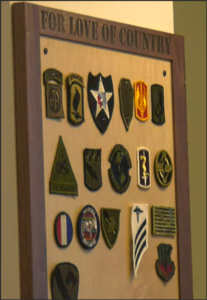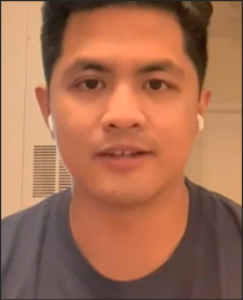
Military memorobilia at the Veterans Center. Photo credit: WVIR-TV
by James A. Bacon
The Student Veterans of America (SVA) at the University of Virginia notched up a small win Friday when Student Affairs officials reversed a decision to expropriate some of the Veterans Center space at Newcomb Hall. But the veterans’ battle for recognition and respect at UVa is far from over.
What they need most, student veterans say, is for Student Affairs to designate someone with specialized knowledge of the G.I. Bill and other veterans issues to help them through UVa’s bureaucratic maze.
Veterans comprise a tiny fraction of the undergraduate student body at UVa. SVA leadership estimates there are only 60 veterans among the 17,000 undergraduates. That count may not have identified every undergraduate veteran, but Tomas De Oliveira, president of the club, says it represents most.
“It’s a chicken-or-egg problem. There aren’t enough vets to justify a significant commitment of UVa resources,” De Oliveira says. But the lack of support makes it difficult to recruit veterans cycling out of the military. UVa vets have friends. Word gets out. “Why would I recommend UVa?”
The Students Veterans chapter traditionally has been an inward-looking group. The veterans typically are five, 10, 15 years older than other undergraduate students. Many have families. Many were stationed overseas or exercised command over others, and they tend to be more worldly and mature. Some have seen combat and experienced PTSD. The Veterans Center at Newcomb Hall is where they create a community with others from a military background. Among other activities, the club has raised funds for Afghan and Ukrainian refugees and is organizing a mental health symposium this fall.
President Jim Ryan has expressed his determination to promote diversity “across every possible dimension” at UVa. The idea is that people with diverse experiences and insights add richness to everyone’s educational experience. Many UVa’s student vets, who are racially/ethnically diverse themselves, have been stationed as far afield as the Middle East, Africa, Europe and Asia, and they have been exposed to a wide range of cultures. They bring perspectives to UVa that few others can.
UVa has provided modest support to the student vets. Funds for the Veterans Center have come from Student Council, the Jefferson Trust, and the Mystic Order of Eli Banana, a secret society. President Ryan even dedicated one of his Boston Marathon runs to raising $26,000 for the Center, which opened in 2021 in the basement of Newcomb Hall as a space where student veterans and students enrolled in ROTC programs could gather. Ryan was among those who delivered remarks at the opening.
Otherwise, support for the veterans has been shallow. One assistant dean of students, David A. Sauerwein, took an interest in the veterans among his other duties. Student vets appreciate his involvement, but say he never mastered the intricacies of the G.I. bill, which is a major source of veterans’ college funding. The application of G.I. benefits is a particularly tricky issue for vets who aspire to attend graduate or professional school. Some students admitted through the Posse Foundation are required to exhaust their G.I. benefits before receiving other types of financial aid, but the vets would like to save the G.I. benefits to help in graduate school.
Recent events have severely eroded the student vets’ trust in the administration. De Oliveira and others interviewed by The Jefferson Council still have been unable to piece together the decision-making process that led to the seizure, since reversed, of the Veterans Center conference room. The SVA was never consulted about the move. Sauerwein told students that the decision was sprung on him with about 48 hours’ notice in May, right after final exams when many were leaving for the summer.

Romeo Sarmiento
Romeo Sarmiento, the club treasurer, recalls visiting the Veterans Center after exams. The conference room had been transformed. The flags of the various military services had been removed. The furniture was gone. The big-screen TV had disappeared. The walls had been repainted. And the belongings of the new occupant, Assistant Dean Sauerwein, had been installed. The change was a shock, said Sarmiento.
The vets have no complaint against Sauerwein personally. They say the assistant dean has been attentive to their concerns and has advocated on their behalf, and they take it on his word that he was not involved with the decision to relocate from the main Student Affairs office in Peabody Hall. “We feel like he was caught in the middle,” says De Oliveira.
Student vets say that Chris Holstege and Cedric Rucker, who are running Student Affairs on an interim basis since the unexplained departure of Dean Robyn Hadley last month, told them that they played no role either in the decision to carve out the conference room from the Veterans Center.
De Oliveira says that the decision appears to have been connected to the expansion of the Office of Safety in Peabody Hall, which required a reallocation of office space for the staff. Someone probably thought it made sense to put Sauerwein in the Veterans Center, as he had been their advocate in Student Affairs. Yet there were several vacant spaces adjacent to the Center where he could have moved without disrupting anything. “Why did the space have to come from us?” De Oliveira asks.
The conference-room issue has been resolved to the vets’ satisfaction. The new Student Affairs leadership arranged to place Sauerwein in an adjacent space. But no one can tell the vets when they’ll get their furniture and TV back to make the conference room functional.
“Apparently, the same urgency that was applied to move Assistant Dean Sauerwein in cannot be applied when moving him out,” says Sarmiento.
James A. Bacon is executive director of The Jefferson Council, an alumni organization dedicated to upholding free speech, viewpoint diversity, and the Jeffersonian legacy at the University of Virginia.


